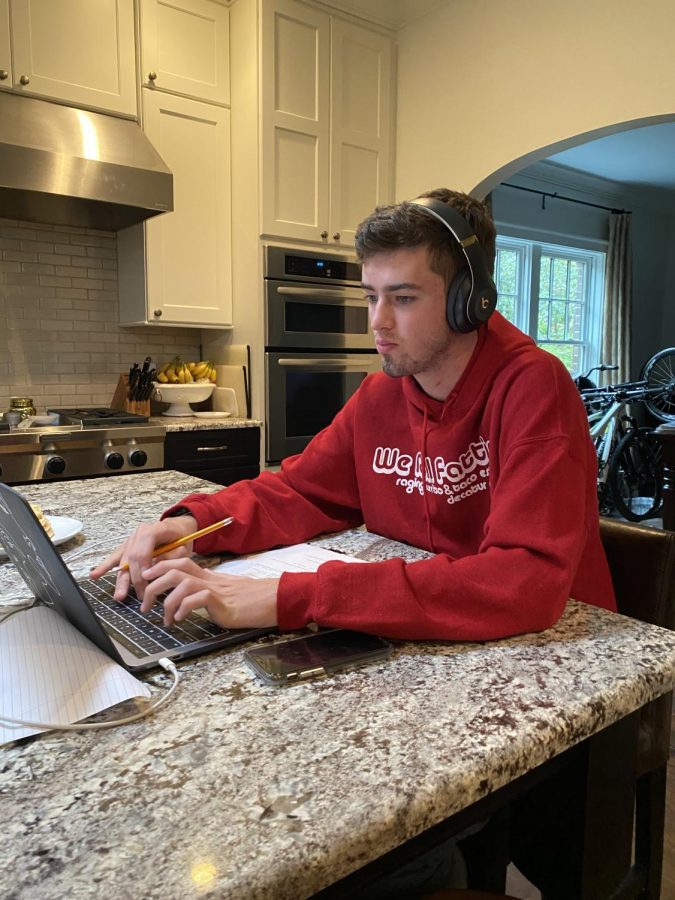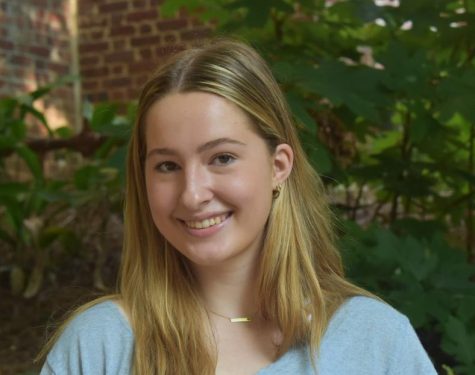Pajama-clad, students shift to virtual classrooms amid coronavirus shutdown
Senior Jack Palaian, like students across Atlanta Public Schools, does schoolwork from home during the coronavirus pandemic that shut down schools. Most assignments are delivered through Google Classroom.
March 30, 2020
There’s a new normal for students as the coronavirus health crisis has shut down schools and forced a shift to virtual learning.
In lieu of in-classroom teaching, Grady requires all teachers to post assignments on Google Classroom, an online education platform, and be available during regular school hours. They must also post one grade per week.
Students are directed to follow an alternating A-B schedule and be “responsive” during the school day. They are learning how to adjust to the new situation.
“Online learning has been pretty fun so far,” freshman Pierce Hopkins said. “I get to stay in my pajamas all day, FaceTime my friends so we can work together, and the work isn’t as much as I thought I’d be getting.”
A typical online school day varies from student to student, since there are few ways for teachers and administrators to monitor students remotely. Students choose when they wake up, when they open assignments and when they take a Netflix break, but many teachers encourage them to remain responsible and engaged.
AP Spanish teacher Liliana Ortegon said she hopes students understand “this is not the time to wake up late, or not participate in virtual classes.” She holds class on Google Meet, a group video call platform similar to Skype, during regular periods and keeps track of attendance.
Engineering, drafting and design teacher Melissa Nunnink also uses Google Meet but said she understands if some students can’t join during class. She assigns about an hour of work per assignment and hopes it “doesn’t feel like a burden.” From a survey she shared with her students, she learned that some students are now becoming babysitters or taking jobs to help their families during their time at home.
“A lot of kids are overwhelmed,” Nunnink said.
During her Google Meet sessions, she noticed how some students lingered after her instruction finished, creating a virtual community, something Nunnink liked to see.
“They talk like they talked at their desks when they were in class,” Nunnink said.
Other students are depending on platforms like Google Meet, whether in or outside of school, to stay connected and positive with their friends and peers.
“Some of my teachers have been hosting Google Meets for classes which has really helped with the feelings of isolation, and there are lots of apps like House Party and Zello to help me stay connected with my friends,” junior Lauren Silcock said.
However, technology dependence makes school more difficult for some students, whether they lack adequate resources or encounter Internet issues.
“It’s been an easy transition for most of my classes, but the fact that some teachers who are using Google Meet still take attendance isn’t really fair,” sophomore Daniela Restrepo said. “Google Meet causes my computer to crash.”
Grady students aren’t the only ones experiencing difficulties with online learning.
“The virus has made it harder to contact teachers about assignments and grades,” North Atlanta sophomore Cooper Buck said. “A teacher put in a missing for something I did, and it was difficult to get in contact with her in order to fix it.”
Students with learning disabilities face unique challenges adapting to online learning.
“I feel like I need more guidance than I am getting in classes,” senior Jordan Tucker said. “I have ADHD, so learning at home has been especially difficult for me because of all the distractions I have.”
While some students don’t enjoy the new virtual learning, other students find it better than regular school.
“I actually feel like I’m learning more than I normally would in real school.” sophomore Talia Heath said. “There’s less distractions and I feel like I can manage my time much better.”
Without seeing their friends every day, students are learning to entertain themselves without leaving their houses.
“To cope with social isolation I’ve been playing a lot of games, a lot of at-home yoga, FaceTiming my friends, and watching some new shows like Good Girls, and of course, all the work we have to do,” junior Avery Forster said.
Teens across Atlanta look on the bright side to remain positive.
“I do think that the actions we are taking to prevent the spread of coronavirus are necessary, so I am trying to stay positive and thankful that the hardest part of this has been losing my senior year rather than someone I love,” Tucker said.







